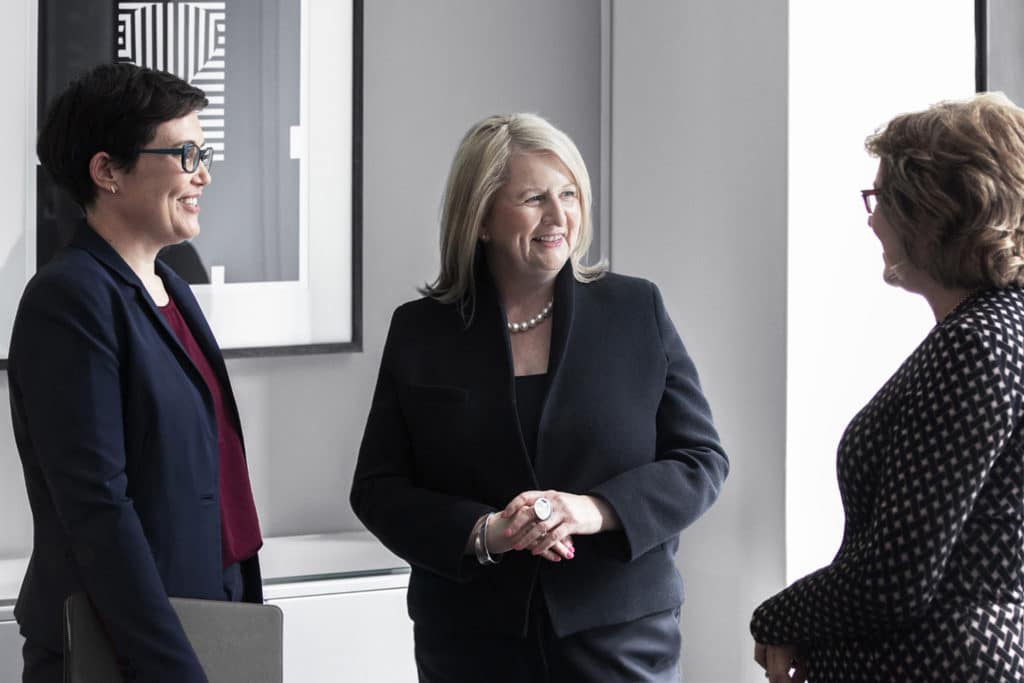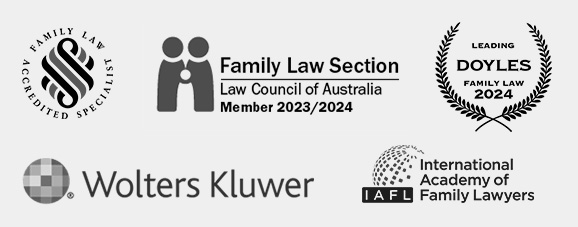Divorce & Separation
Divorce Lawyers Melbourne
Getting a divorce is generally a straightforward process that finalises a marriage. For complex divorce matters that require additional support through an otherwise difficult moment in your life, then allow our strategic divorce lawyers guide you through representation, by providing you with a pragmatic and personalised service that you can rely on.
Book an appointment with our leading Melbourne divorce lawyers


Divorce & Separation Lawyers
Our Divorce Lawyers Provide Guidance for Complex Matters
Our highly experienced team can step you through the process of finalising a divorce, assisting you in meeting any additional challenges. This may be due to issues accessing marriage records, religious considerations, living under the same roof, family violence or difficulty locating the other party.
You can feel assured that you will receive the right advice from Forte Family Lawyers and work with some of the most highly skilled family and divorce lawyers Melbourne offers.
Why seek advice from our divorce lawyers?
Extensive Experience
Work with a team who have the experience to help you navigate even the most complex divorce and family law matters.
Accredited Specialists
As Accredited Family Law Specialists, our lawyers are recognised for their high quality and standard of work.
Expert Guidance
We take a diligent and pragmatic approach to guide you through what we know can be a highly emotional time.
Book an Appointment
Get started by booking an appointment with one of our team members.
"*" indicates required fields
Quick Links
Hidden First Field
Contents
- How do I get a divorce?
- Do I need a lawyer to get a divorce?
- How do I choose a good divorce lawyer?
- What is the process of getting a divorce?
- Do you have to be separated for a year to get a divorce?
- How much does it cost to get divorced, and who pays for it?
- How long does it take to get a divorce?
- Can I represent myself in a divorce case, or do I need a lawyer?
- How can I ensure a fair settlement in my divorce case?
- How does the court determine child custody in a divorce case?
- What is the impact of family violence (or domestic violence) on divorce proceedings?
- What happens if my spouse refuses to agree to a divorce?
- Can I get a divorce if my spouse lives in a different country or can’t be located?
- Do I need to make Parenting Orders before I get a divorce?
- What implications will my religious beliefs have in a divorce?
- What will happen to my Will?
How do I get a divorce?
To get a divorce, you must be separated for at least 12 months. We generally encourage our clients to apply for their divorces themselves. For most people, this is the most straightforward part of dealing with a separation.
Joint application vs sole application?
If a joint application for divorce is made, the process becomes much easier. There is no need to have the application personally served upon the other party.
If you make a sole application, then you cannot serve the application on the other party yourself and a 3rd party will need to be engaged in order to do so.
Do I need to go to court to get a divorce?
If you are applying for a divorce with a joint application, then you won’t be required to attend court. However, you will need to go to court if:
- you have made a sole application and there is a child of the marriage aged under 18 years at the time the application was filed.
- the other party files a response opposing your application.
- and certain other limited circumstances.
Divorces with entangled assets?
If you have joint ownership of assets, you should not file for divorce immediately after the 12 months has expired. Once your divorce is finalised, a time limit is set on settling property matters and applying for spousal maintenance.
We recommend that in most cases you do not apply for a divorce until your property and/or spousal maintenance matters have been finalised or court proceedings have commenced.
Does a divorce cover child / spousal / property arrangements?
No. The divorce process is separate to these and you must undertake a separate process. To read more visit our child support or spousal maintenance and dividing your property resources.
Divorces under one roof?
If you were separated under one roof for part or all of the period, then you will need additional evidence to support your application.
Divorces with a marriage less than 2 years?
If your marriage was less than 2 years in duration, you and your spouse must attend marriage counselling before filing for a divorce. In limited circumstances, the court may grant you permission to file your divorce application without attending counselling.
Do I need a lawyer to get a divorce?
You don’t need to get a lawyer for divorce. In Australia, divorce is quite separate from property and parenting matters and is usually quite straightforward. At Forte Family Lawyers we encourage you to apply for your own divorce as this is one way that you can save on legal costs. We can, of course, help you with anything you are unsure about.
We often act for parties obtaining a divorce where the circumstances are more complex. This may be having a marriage certificate in a language other than English, not being able to prove their marriage because the records have been destroyed, being separated under one roof for part of the 12 month time limit, or being unable to locate the other party.
How do I choose a good divorce lawyer?
If you have decided to work with a divorce lawyer, it’s worth researching to ensure you will receive sound legal advice. You can ask people you know if they can recommend someone, read over websites and social media reviews, and get an overall feel for divorce lawyers you may want to work with.
If you are also managing family law matters, working with Accredited Family Law Specialists like Forte Family Lawyers will ensure that you have specialist advice to navigate your matter successfully. A family law matter and divorce proceedings are not the same. A divorce lawyer will help with any divorce applications needed to be made in the Federal Circuit and Family Court and can also assist with making proper arrangements if there has been any domestic violence, such as physical or emotional abuse.
Working with experienced lawyers after a relationship breakdown can help both parties manage the entire process. A good divorce lawyer will help you make an informed decision each step and obtain the best outcome possible.

What is the process of getting a divorce?
At Forte Family Lawyers we encourage you to apply for your own divorce as this is one way to save on legal costs.
In Australia, you will need to apply for a divorce application through the courts. This can be done in two ways:
Joint Application
This is when both parties agree on the divorce. The application can be submitted and even processed online, unless you have children under 18. Neither party will require paperwork to be served in this case.
Sole Application
This is when one party makes an application for divorce directly through the court system. The application is made online, but the relevant paperwork needs to be ‘served’ on the other party. You won’t be able to hand this paperwork directly to the other person, or it may be deemed as having been served incorrectly.
Divorce applications must be filed correctly, and parties must be able to show they have lived separate lives for one year. Paperwork is filed on line with the court, and a court hearing is set, often a few months in advance. A divorce is granted by court order at a hearing, and the divorce is deemed official a period of 1 month and 1 day after the hearing date.
Do you have to be separated for a year to get a divorce?
Yes, in Australia, by law, you must wait 12 months after being separated before applying for a divorce. This is generally thought to stop couples from making hasty decisions to end a marriage when there is a chance for reconciliation.
You don’t have to be living apart for this period, though. Many couples live under the same roof during this period for a variety of reasons.
Another factor to be aware of is if you have been married for less than two years. Even if you have been living apart for one year, Australian courts generally require a divorce to be applied for no less than two years after the marriage date.
You may be required to go to counselling if you have been married for less than two years or apply to the court for special permission to divorce.
How much does it cost to get divorced, and who pays for it?
Assuming you apply for your divorce and therefore don’t incur any legal costs, the main cost you can expect to incur is the filing fee. Suppose it is a sole application rather than a joint application. In that case, you will typically pay for a process server to serve the documents on the other party, usually in the vicinity of $100-$200.
The court fee as of 1 February 2023 is $990, or you may be eligible for a reduced fee of $330, or to be exempt altogether.
How long does it take to get a divorce?
The typical divorce process is 3 to 4 months from the time of filing the divorce application. When this has been done, a hearing date will be set, typically within 2 to 3 months. The court allows sufficient time for the application to be served before the hearing.
If making a sole application, and the other party (called the respondent) is in Australia, the documents must be served at least 28 days before the court hearing.
The documents must be served at least 42 days before the court hearing if the respondent is overseas. Sometimes, these times can be shortened, but you need a good reason. A divorce order takes effect one month and one day after it is made, although the court can shorten this time.
A divorce order is effective one month after the order is made.
Can I represent myself in a divorce case, or do I need a lawyer?
The good news? You generally won’t need a lawyer for a divorce hearing alone in Australia unless there are factors that complicate the process.
If you are applying for a divorce, and both parties are in agreement, filing for divorce is quite a straightforward process. If you have a Joint Application (where both parties are applying together), you can make an application online and don’t need to attend court. If you are applying on your own accord, or have children together who have not yet reached 18, you will need to attend court although the hearing may be on line.
Most divorces aren’t a ‘case’ so much; they are generally a short hearing where the court grants a Divorce order. Having a divorce lawyer represent you at the hearing is a personal choice. Divorce lawyers in Melbourne, and Victoria, are commonly engaged when relationships end for parenting (or custody) and property settlement matters, which are a separate process entirely. These matters are heard in the Federal Circuit Court and Family Court of Australia and can be quite complex to navigate. A couple doesn’t need to have been married to be involved in parenting (or custody) or property settlement cases.
We often act for parties obtaining a divorce where the circumstances are more complex.
Some factors will generally indicate the need for legal assistance, including;
- Having a marriage certificate in a language other than English,
- Being unable to prove marriage records exist
- Being separated under one roof for part of the 12-month time limit and,
- Being unable to locate the other party or having difficulties serving paperwork
A divorce lawyer is generally engaged for matters related to divorce, such as property and parenting matters, rather than the actual divorce hearing itself. We can, of course, help you with anything you are unsure about.
How can I ensure a fair settlement in my divorce case?
Filing for a divorce is not the same as a property settlement; they are two different processes, although they often occur at around the same time.
Generally, property and parenting (or custody) agreements are made by private agreements (or contracts) written up in a particular way, or by orders made by consent in the Federal Circuit Court and Family Court of Australia . These orders may be fully agreed on by both parties and signed off at a hearing or even without a hearing. In other cases, there may be a lengthy process if both parties cannot agree.
Regarding property settlement, it’s essential to understand how settlement works. The courts lean towards a ‘just and equitable’ outcome, that considers monetary and non-monetary contributions, future needs and earning capacity of both parties, and the best interests of the children involved. If you need advice about legal matters related to property and financial settlement, we invite you to book an initial consultation with our team.
Our team of divorce and family lawyers work with many Melbourne families to help them successfully navigate financial matters and financial settlement. We also provide support and a high level of expertise to couples negotiating long-term parenting plans and child custody arrangements.

How does the court determine child custody in a divorce case?
The court doesn’t determine child custody in a divorce hearing. A divorce hearing is separate from family law matters such as parenting matters and property settlements. Forte Family Lawyers provide both divorce and family law services and can assist you with divorce hearings and other family law court matters.
Some people wish to resolve divorce, property settlement, children’s matters, and other family law matters as soon as possible, and others will need to work with a Family Dispute Resolution Practitioner before going ahead with legal proceedings. As trusted Melbourne family lawyers, we provide personal service and expert advice for all divorce and family law-related matters. We work with same-sex and de facto couples, with all issues relating to relationship breakdown, separation and divorce.
What is the impact of family violence (or domestic violence) on divorce proceedings?
Family violence has many impacts and can be the main reason a relationship ends. If there are orders in place, such as an Intervention Order or a Child Protection Order, it may require that one party remains at a distance from the other party, which may extend to children involved.
Different types of orders may be sought in the case of family violence. An Intervention Order or Family Violence Order is obtained in the Magistrates’ Court. The police may apply for a Safety Notice, Interim Intervention Order or Final Intervention Order on your behalf. You may need a lawyer to help negotiate the terms of the intervention order or re-negotiate parenting arrangements.
If you have been served with a Safety Notice or an Interim Intervention Order, we can help you oppose it and negotiate the terms of the Interim Intervention Order and any Family Law Act order so you can continue seeing your children.
Restraining orders can be made in the Federal Circuit and Family Court of Australia to prevent parties from, for example, selling the property until the court makes an order or you both agree that this occurs. Restraining orders can be used to protect your property until there is an agreement or court order and also to protect children by requiring the parents to behave in ways that advance their best interests, such as not denigrating the other parent when the children can hear or not move the children interstate or overseas.
If you need support for your divorce, please contact Forte Family and Divorce Lawyers, Melbourne.
What happens if my spouse refuses to agree to a divorce?
In Australia, you can apply for a divorce even if your partner doesn’t agree to it. You need to have been separated for one year, even if you have been living under the same roof. There is a small margin of space to dispute a divorce, but if a legal marriage has broken down irretrievably, then in almost all instances, the court will grant a divorce.
Can I get a divorce if my spouse lives in a different country or can’t be located?
Yes, you can, although slightly different criteria will apply. Service of the Divorce Application is a standard part of the divorce process. If your partner cannot be located, you can apply to the court to allow for substituted service or dispensation of service. This means that the court may allow for an alternative service or no service at all.
If your partner lives overseas, you can still apply for divorce. You need to take reasonable steps to ensure service and allow 42 days to pass after service before a court hearing takes place.
Do I need to make Parenting Orders before I get a divorce?
Not at all. A divorce hearing is separate from parenting matters, child custody and property settlement, which a family lawyer can help you with. Forte Family Lawyers provide divorce and family law services and can assist you with divorce hearings and court matters. Some people wish to resolve divorce, property settlement, children’s issues and family law matters as soon as possible, and others will need to work with a Family Dispute Resolution Practitioner before going ahead with legal proceedings. As trusted Melbourne family lawyers, we provide personal service and expert advice for all divorce and family law-related matters. We work with same-sex and de facto couples, with all issues relating to relationship breakdown, separation and divorce.
What implications will my religious beliefs have in a divorce?
For some of our clients, separation and divorce have religious implications.
A Jewish gett, a Sharia talaq and a Catholic annulment are of no effect in Australian civil law. A divorce under the Family Law Act will also be necessary.
Jewish Gett
Under Jewish law, a civil divorce is not recognised without a gett. A gett is generally drawn up by a Beth Din (Rabbinical council). A marriage is dissolved by the husband granting a gett voluntarily and the wife voluntarily receiving it. Without this, religious divorce is not recognised.
The Family Court or Federal Circuit Court may try to phrase the orders to assist a wife to obtain a gett from a husband who may otherwise be reluctant to give it.
Sharia Talaq
Islamic law aims to establish a healthy family unit through marriage. However, if this fails, then divorce is permitted. The husband must pronounce ‘talaq’ for the divorce to be effected. The general principle is that when the husband pronounces ‘talaq’ three times, divorce is effected. A wife who seeks a divorce will usually need her husband’s consent.
If a wife has a genuine objection, she may also obtain a divorce without the husband’s consent. Reasons to ask for a divorce include a wife dislikes a husband’s treatment of her, or if he has failed to meet his responsibilities of the marriage. Divorce can be requested by a wife and is granted by a husband upon the wife paying the husband a sum of money. The amount is limited to the amount provided by a husband as a gift to a wife during the marriage.
Catholic Annulment
An annulment, or decree of nullity, is an official declaration the church makes. It declares that some of the necessary elements of a marriage were missing at the time of the wedding. A decree of nullity declares the marriage, as recognised by the Catholic Church, did not exist as it was invalid. The Catholic Church requires that a divorce under the Family Law Act is obtained before a marriage is annulled.
What will happen to my Will?
If you have a Will, we recommend that you make a new Will reflecting the fact that you have separated. The divorce process has no direct effect to this.
Your existing Will remains valid unless you sign a document revoking it. If you do not have a Will, we recommend that you obtain one immediately. The law of intestacy means that if you were to die without a Will, your spouse is entitled to a share of your assets.
If you divorce, any provisions relating to your spouse become invalid. In some circumstances, you may not want this to occur. You need to ask your wills & estates lawyer to draft a will in terms that ensure it is still valid.
If you remarry, your will automatically becomes invalid – unless your will is made in contemplation of marriage.
Customer Reviews
Contact Forte Family Lawyers
CONTACT
Our professional Family Lawyers in Melbourne are ready to listen.
Level 2
535 Bourke Street
Melbourne 3000 Victoria Australia
PO Box 13172
Law Courts
8010 Victoria Australia
DX 364 Melbourne
Telephone
61 3 9248 5800
Email
enquiries@fortefamilylawyers.com.au

"*" indicates required fields
